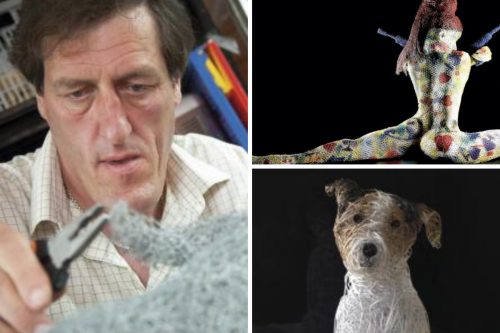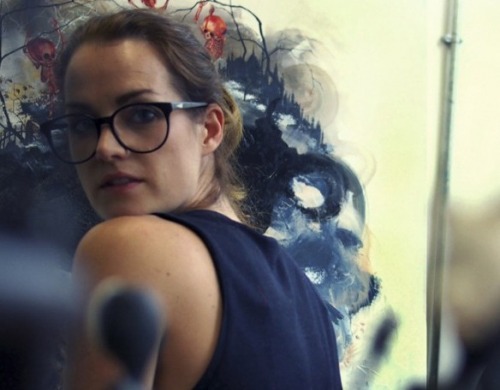Two Giant Leaps

Why would anyone go on a one-way trip to Mars?
Twenty-year-old Ryan McDonald has got his whole life ahead of him – and he wants to spend it on Mars. One of only 1,058 people around the world, Ryan has been shortlisted for the Mars One mission to establish a permanent human settlement on Mars in 2025. 'We need a second planet we can live on in the future to safeguard ourselves effectively,' he explains. 'Mars is the only place we can actually imagine living in the long term. The moon would be good for some industry but it's not a place we can make a home. We could really make Mars a home. It does get cold if you go near the poles, but we're not crazy enough to do that!'
'Crazy' is a word quite a lot of people would use for the mission, which is set for 2025, just over 10 years away. I wonder what drove Ryan, who is in the last year of a Physics degree at Oxford University, to sign up. 'What interests me is the inspiration value, just like with the Apollo projects – after that we had an entire new generation of scientists and engineers who gave us things like the internet, which is obviously useful for everyone. It's not just about sending people to Mars, it's about what we can bring back that improves everyone's quality of life.'
Hannah Earnshaw, 23, a PhD student at Durham University, has similar dreams of mankind starting new life beyond the stars. 'I've been interested in space since childhood and I do actually have a childhood memory of wanting to be the first person on Mars! I'm really interested in seeing space exploration advanced and I think the establishment of a colony on another planet is the obvious next step.'
Following unmanned missions in 2018 and 2020, Mars One crews will depart every two years from 2024, with the first crew of four people landing on the red planet in 2025. The Netherlands-based not-for-profit organisation behind the mission is led by Dutch entrepreneur Bas Lansdorp, who until 2013 was almost entirely self-financing the project (though he won't be part of the crew). Oh, and because this is the 21st century, every step will be documented for a reality TV programme.
As well as being scientists, Hannah and Ryan believe they are psychologically suited for the task. 'I'm a fairly introverted person and I thrive off small numbers of close relationships, so I would suit the dynamic of a small crew and a small community on Mars,' says Hannah. 'I think I'm quite good at problem solving and I also don't tend to panic.' Ryan, who speaks to me over the phone from Iceland, says, 'I like exploring, discovering new things. I've also written a science fiction novel which I'm working towards publishing, so I suppose I'm quite creative.'
Both found out about the project in a way that wouldn't have been possible in Neil Armstrong's day – social media. Ryan says, 'I stumbled upon a lecture given by the co-founder on YouTube and thought, "Wow, these people are proposing going to Mars 10 years before NASA. It really caught my attention.' For Hannah it was a link on Twitter. 'I came across the website which I then read pretty much all the way through.' Did she want to sign up straight away? 'My gut reaction was yes, I knew that from about 15 minutes on the website. But after that I had to think, "Is it a realistic mission? What are the sacrifices I'm prepared to make?" I considered that for as long as possible and then applied about two weeks before the deadline.'
Both applicants are now waiting to hear if they're through to the next round, and are undergoing a rigorous programme of testing. 'We have to submit information about our qualifications, have psychological profiling, record a video explaining our motivations,' says Ryan. 'Our medical requirements were absolutely key, and we had various medical exams at the beginning of this year to test that we could physically cope with it. We have interviews before Christmas with a selection committee because in future rounds we get paired up with groups that are psychologically compatible.' And if that all sounds a bit like preparing for the Big Brother house, the final round is living in a simulation habitat with four other people who have reached the final stages, scheduled for the end of 2015. Training will then commence, but if they don't get selected for the first mission then applicants can keep training for future missions.
The mission has not been without its controversies. The low budget of only $6 billion compared to NASA's expectations of spending $100 billion on a similar project has raised alarm bells, and Astronauts including Ulrich Walter and Buzz Aldrin have cast doubts on the project. 'Naturally I was a bit sceptical because, well, I'm a scientist!' Ryan jokes. 'But I looked into the technical detail behind it. I thought it was actually a really simple mission, so much simpler than what's being proposed by the space agencies. There is some perfectly legitimate criticism of the funding model but from a technical and scientific standpoint it's completely feasible.'
Hannah is unperturbed by the risk inherent in space travel. 'Facing those challenges and the possibility that we die – it's worth the risk. It's the right thing to do and I'm happy to put my life on the line for it. New technology eventually becomes commonplace but not before there is that period of people actively pushing it forward. Commercialisation follows in its wake and eventually people will be taking day trips to Mars!' she laughs. 'But it requires people to take the first step.'
Ryan adds, 'The most scary thing is take off and landing; that's where almost all of the risk is. When people went on the famous shuttle missions there was a three percent chance of dying but we will have substantially safer missions than that. This will actually be one of the safest space missions in history.'
The really frightening aspect of the mission, of course, is the one-way ticket. Boldly going is all very well as long as you can meekly crawl back if you don't like it, and the pain of saying goodbye to friends and family would be too much for most. But Hannah says her friends and family have been supportive. 'I kept my family in the loop about the project and gradually introduced the idea that I might want to apply. At every stage they've had my back and been really excited for me.' Ryan has had some difficult conversations. 'I'm very close to my little sister and she didn't want me to go, but we've discussed it and if it's something I really want to do then she understands that.' Contact with earth will still be possible, but only through recorded messages which will arrive around 20 minutes later.
As well as missing home and family, Hannah adds, 'I will really miss the ability to travel places – one of the things I like to do is to wander around and have an explore. Obviously exploration is a big part of why we're going to Mars but how that works out in an everyday sense is very different.'
And then there's the other great travel anxiety – packing. 'It's tough when you go abroad and have 20kg luggage allowance – imagine having 10kg allowance for the entire rest of your life,' says Ryan. 'It's obviously important we take certain personal items so we can remember. With regard to leisure we'll have e-readers so we effectively have access to every book written ever. We will be extremely busy on Mars – I don't think boredom is something we're going to be bringing with us!'
Our early colonisation will be managed carefully, and going forth and multiplying is not on the agenda initially. Ryan says, 'We don't know if a foetus can develop properly in those conditions. We wouldn't want a woman to die in childbirth when you only have four or eight people on Mars. We would have the facilities to handle a pregnancy if it did happen but we obviously wouldn't encourage it. However, long term you want a self-sustaining population.'
So – a bold and pioneering leap forward? A surefire disaster movie blockbuster for 2035? And will there be life on Mars? 'I believe it is possible for it to be done but we're not going to find out unless someone takes the plunge and says, "Let's do this,"' says Hannah. 'People say, "You're signing up for a suicide mission to go die there,"' adds Ryan. 'No – what we're signing up for is to live there.'
Hannah and Ryan will be speaking to Astronomer Gurbir Singh at Settle Storytelling Festival on Saturday 11th October at the Friends Meeting House, 3pm–4.30pm. The festival is the largest storytelling festival in the North of England, and also conveniently falls within World Space Week. Other space events include a scale solar system exhibition, crafts and a competition to design your own spaceship. Other events include Appalachian songs and stories with Grammy nominated Jerry Harmon, a workshop on how to be a 21st century fool with Jonathan Kay, and a candlelit story trail.











